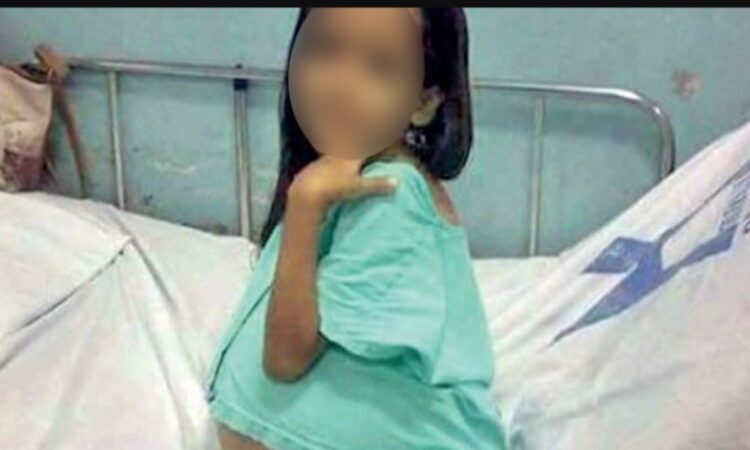9-year-old girl was brought to hospital pregnant, ‘doctors screamed and were left stunned when DNA test results revealed who the father is’!

The hospital walls had seen countless tragedies, but nothing like this. When the tiny nine-year-old girl walked through the doors clutching her swollen belly, nurses initially thought it was a tumor. Then the pregnancy test came back positive, and the medical team’s blood ran cold. This wasn’t just a case file – it was a living, breathing child carrying another child.
Dr. Ndlovu*, the pediatrician who first examined her, had to steady herself before continuing the examination. “Her hips hadn’t even fully formed yet,” she recalled later, voice trembling. “The ultrasound showed a fetus developing in a body that should have been playing with dolls, not preparing for motherhood.”
The girl, whom we’ll call Thandi to protect her identity, sat quietly during examinations, her feet dangling far above the floor from the exam table. When asked simple questions about school or her favorite foods, she’d answer in whispers. But when doctors gently inquired about how she became pregnant, Thandi would curl into herself like a leaf in fire.
Initial suspicions fell on Thandi’s father when police were called. Neighbors in their Harare township reported hearing frequent arguments in the household, and the 29-year-old man was arrested amid growing outrage. But when DNA results returned from the National University of Science and Technology, they revealed a more complex horror – the baby’s father was Thandi’s 13-year-old cousin, a boy barely into puberty himself.
Child welfare investigators pieced together a disturbing picture. The two children had been left unsupervised for hours daily while adults worked. In the shadowy corners of their cramped home, something unthinkable had occurred between elementary schoolers who should have been worrying about homework, not sexuality.
Medical tests revealed Thandi suffered from precocious puberty, her body betraying her by developing years ahead of schedule. “Her hormone levels were those of a teenager,” explained endocrinologist Dr. Chikwava. “But emotionally, she was very much a little girl who still slept with a stuffed rabbit.”
This biological fluke made pregnancy physically possible, but did nothing to explain how two children found themselves in this situation. Child psychologists noted both Thandi and her cousin displayed troubling knowledge of adult matters far beyond their years, suggesting possible prior exposure to abuse or inappropriate materials.
Social workers intervened as the story unraveled. Thandi’s cousin was removed from his home, equally a victim in this tragedy. “These are both children who’ve been failed by every adult around them,” said a tearful caseworker. “Someone should have been watching. Someone should have noticed.”
Thandi’s father, though cleared of fathering the baby, faced scrutiny for the unsupervised environment. Neighbors reported the children were often left alone for entire weekends. “We thought they were just playing video games,” one admitted guiltily. “Not… this.”
As Thandi’s pregnancy progressed, doctors faced agonizing decisions. Her 62-pound body couldn’t safely deliver a baby. After extensive counseling with child psychiatrists and judicial approval, a termination was performed at 14 weeks. “It was the least terrible option in an ocean of terrible options,” her gynecologist said quietly.
Today, Thandi lives with a foster family specializing in trauma cases. She attends therapy three times weekly and has regressed to babyish behaviors – thumb-sucking, bedwetting – that psychologists say represent her subconscious attempt to reclaim the childhood stolen from her.
Her cousin remains in juvenile detention, receiving counseling for what experts term “perpetrator-victim” syndrome. Neither child truly understands the gravity of what occurred between them, only that they’ve been separated from everything familiar.
The case sent shockwaves through Zimbabwe, sparking national debates about child supervision, sex education, and early puberty screening. In Thandi’s neighborhood, parents now keep closer watch on their children, the easy assumption that “kids will be kids” forever shattered.
At the local primary school, teachers report a new vigilance. “We notice now when a girl stops jumping rope,” said one educator. “We question when a boy knows too much. We can’t unsee what happened to Thandi.”
As for Thandi herself, her foster mother says she’s slowly healing. “Some days she colors pictures of families with two children close in age,” the woman shared. “Other days she destroys them. But every day, we remind her she’s safe now.”
The stuffed rabbit sleeps beside her still.




